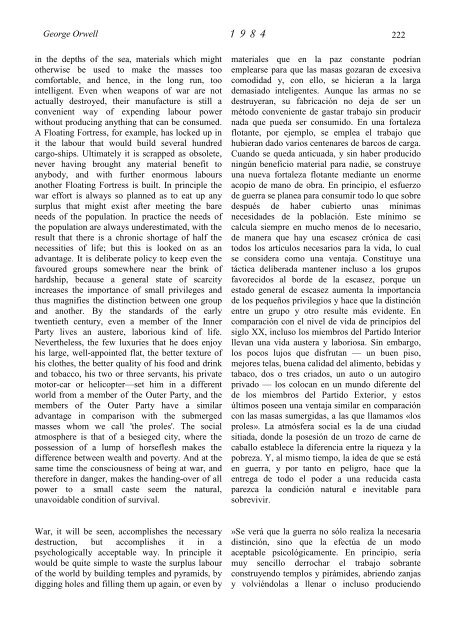You also want an ePaper? Increase the reach of your titles
YUMPU automatically turns print PDFs into web optimized ePapers that Google loves.
George Orwell 1 9 8 4<br />
in the depths of the sea, materials which might<br />
otherwise be used to make the masses too<br />
comfortable, and hence, in the long run, too<br />
intelligent. Even when weapons of war are not<br />
actually destroyed, their manufacture is still a<br />
convenient way of expending labour power<br />
without producing anything that can be consumed.<br />
A Floating Fortress, for example, has locked up in<br />
it the labour that would build several hundred<br />
cargo-ships. Ultimately it is scrapped as obsolete,<br />
never having brought any material benefit to<br />
anybody, and with further enormous labours<br />
another Floating Fortress is built. In principle the<br />
war effort is always so planned as to eat up any<br />
surplus that might exist after meeting the bare<br />
needs of the population. In practice the needs of<br />
the population are always underestimated, with the<br />
result that there is a chronic shortage of half the<br />
necessities of life; but this is looked on as an<br />
advantage. It is deliberate policy to keep even the<br />
favoured groups somewhere near the brink of<br />
hardship, because a general state of scarcity<br />
increases the importance of small privileges and<br />
thus magnifies the distinction between one group<br />
and another. By the standards of the early<br />
twentieth century, even a member of the Inner<br />
Party lives an austere, laborious kind of life.<br />
Nevertheless, the few luxuries that he does enjoy<br />
his large, well-appointed flat, the better texture of<br />
his clothes, the better quality of his food and drink<br />
and tobacco, his two or three servants, his private<br />
motor-car or helicopter—set him in a different<br />
world from a member of the Outer Party, and the<br />
members of the Outer Party have a similar<br />
advantage in comparison with the submerged<br />
masses whom we call 'the proles'. The social<br />
atmosphere is that of a besieged city, where the<br />
possession of a lump of horseflesh makes the<br />
difference between wealth and poverty. And at the<br />
same time the consciousness of being at war, and<br />
therefore in danger, makes the handing-over of all<br />
power to a small caste seem the natural,<br />
unavoidable condition of survival.<br />
War, it will be seen, accomplishes the necessary<br />
destruction, but accomplishes it in a<br />
psychologically acceptable way. In principle it<br />
would be quite simple to waste the surplus labour<br />
of the world by building temples and pyramids, by<br />
digging holes and filling them up again, or even by<br />
222<br />
materiales que en la paz constante podrían<br />
emplearse para que las masas gozaran de excesiva<br />
comodidad y, con ello, se hicieran a la larga<br />
demasiado inteligentes. Aunque las armas no se<br />
destruyeran, su fabricación no deja de ser un<br />
método conveniente de gastar trabajo sin producir<br />
nada que pueda ser consumido. En una fortaleza<br />
flotante, por ejemplo, se emplea el trabajo que<br />
hubieran dado varios centenares de barcos de carga.<br />
Cuando se queda anticuada, y sin haber producido<br />
ningún beneficio material para nadie, se construye<br />
una nueva fortaleza flotante mediante un enorme<br />
acopio de mano de obra. En principio, el esfuerzo<br />
de guerra se planea para consumir todo lo que sobre<br />
después de haber cubierto unas mínimas<br />
necesidades de la población. Este mínimo se<br />
calcula siempre en mucho menos de lo necesario,<br />
de manera que hay una escasez crónica de casi<br />
todos los artículos necesarios para la vida, lo cual<br />
se considera como una ventaja. Constituye una<br />
táctica deliberada mantener incluso a los grupos<br />
favorecidos al borde de la escasez, porque un<br />
estado general de escasez aumenta la importancia<br />
de los pequeños privilegios y hace que la distinción<br />
entre un grupo y otro resulte más evidente. En<br />
comparación con el nivel de vida de principios del<br />
siglo XX, incluso los miembros del Partido Interior<br />
llevan una vida austera y laboriosa. Sin embargo,<br />
los pocos lujos que disfrutan — un buen piso,<br />
mejores telas, buena calidad del alimento, bebidas y<br />
tabaco, dos o tres criados, un auto o un autogiro<br />
privado — los colocan en un mundo diferente del<br />
de los miembros del Partido Exterior, y estos<br />
últimos poseen una ventaja similar en comparación<br />
con las masas sumergidas, a las que llamamos «los<br />
proles». La atmósfera social es la de una ciudad<br />
sitiada, donde la posesión de un trozo de carne de<br />
caballo establece la diferencia entre la riqueza y la<br />
pobreza. Y, al mismo tiempo, la idea de que se está<br />
en guerra, y por tanto en peligro, hace que la<br />
entrega de todo el poder a una reducida casta<br />
parezca la condición natural e inevitable para<br />
sobrevivir.<br />
»Se verá que la guerra no sólo realiza la necesaria<br />
distinción, sino que la efectúa de un modo<br />
aceptable psicológicamente. En principio, sería<br />
muy sencillo derrochar el trabajo sobrante<br />
construyendo templos y pirámides, abriendo zanjas<br />
y volviéndolas a llenar o incluso produciendo


